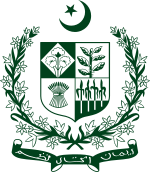
Back دستور باكستان Arabic পাকিস্তানের সংবিধান Bengali/Bangla Verfassung der Islamischen Republik Pakistan German Konstitucio de Pakistano Esperanto قانون اساسی پاکستان Persian Constitution du Pakistan French पाकिस्तान का संविधान Hindi Konstitusi Pakistan ID Costituzione del Pakistan Italian Perlembagaan Pakistan Malay
| Constitution of the Islamic Republic of Pakistan | |
|---|---|
 | |
| Overview | |
| Jurisdiction | |
| Created | 20 October 1972 |
| Ratified | 10 April 1973[1] |
| Date effective | 14 August 1973 |
| System | Federal Parliamentary Constitutional Republic |
| Government structure | |
| Branches | Three (Executive, Legislature and Judiciary) |
| Head of state | President of Pakistan |
| Chambers | Bicameral (Senate and National Assembly) |
| Executive | Prime minister–led cabinet responsible to the lower house of the parliament |
| Judiciary | Supreme court, high courts and district courts |
| Federalism | Federation |
| Electoral college | Yes, for presidential elections |
| History | |
| Amendments | 26 |
| Last amended | 21 October 2024 |
| Location | Parliament House, Islamabad, Pakistan |
| Commissioned by | Parliament of Pakistan |
| Signatories | 5th Parliament (145 out of 150 members) |
| Supersedes | Constitution of Pakistan, 1962 Legal Framework Order, 1970 |
 |
|---|
|
|
The Constitution of Pakistan (Urdu: آئینِ پاکستان ; ISO: Āīn-ē-Pākistān), also known as the 1973 Constitution, is the supreme law of Pakistan. The document guides Pakistan's law, political culture, and system. It sets out the state's outline, the fundamental rights of the population, the state's law and orders, and also the structure and establishment of the institutions and the armed forces.[2] Drafted by the government of Zulfikar Ali Bhutto, with additional assistance from the country's opposition parties, it was unanimously approved by the 5th Parliament on 10 April and ratified on 14 August 1973.[3][4] The first three chapters establish the rules, mandate, and separate powers of the three branches of the government: a bicameral legislature; an executive branch governed by the Prime Minister as chief executive; and an apex federal judiciary headed by Supreme Court.[4] The Constitution designates the President of Pakistan as a ceremonial Head of State who is to represent the unity of the state.[5] The first six articles of the constitution outline the political system as a federal parliamentary republic system; as well as Islam as its state religion.[6] The Constitution also encapsulates provisions stipulating the legal system's compliance with Islamic injunctions contained in the Quran and Sunnah.[7]
The Parliament cannot make any laws which may be repugnant or contrary to the Constitution; however, the Constitution itself may be amended by a two-thirds majority in both the houses of the bicameral Parliament, unlike the previous legal documents of 1956 and 1962.[8] It has been amended over time, and most recent impulses for political upgrades and reforms has been amended. Although enforced in 1973, Pakistan, however, celebrates the adoption of the constitution on 23 March—when the first set was promulgated in 1956 each and every year as Republic Day.[9] Technically there are 26 amendments but 23 amendments were made in constitution and three were not passed by the parliament as the three amendments collapsed.
Currently the promulgated Constitution of Pakistan, in its amended form, stands as the 7th lengthiest constitution of the world with a word count of 56,240 Words.[10]
- ^ "Golden Jubilee celebrations of 1973 Constitution start today". 10 April 2023.
- ^ Abiad, Nisrine (2008). Sharia, Muslim states and international human rights treaty obligations : a comparative study. London: British Institute of International and Comparative Law. pp. 96–200. ISBN 978-1-905221-41-7.
- ^ Enterprise Team (1 June 2003). "The Constitution of 1973'". The Story of Pakistan. Archived from the original on 2 October 2013. Retrieved 15 October 2011.
- ^ a b "The Constitution of Pakistan". pakistani.org. Archived from the original on 12 July 2011. Retrieved 22 January 2013.
- ^ "Part III. The Federation of Pakistan: Chapter 1; The President". Const. of Pakistan. Archived from the original on 7 April 2011. Retrieved 22 January 2013 – via pakistani.org.
- ^ "First Six Articles". Archived from the original on 21 May 2013.
- ^ Iqbal, Khurshid (2009). The Right to Development in International Law: The Case of Pakistan. Routledge. p. 189. ISBN 978-1-134-01999-1.
The constitution proclaims ... that all existing laws shall be brought in accordance with the injunctions of Islam as laid down in the Quran and Sunnah, and no law shall be enacted which is repugnant to such injunctions.
- ^ Iftikhar A. Khan (24 June 2012). "Parliament can't make laws repugnant to Constitution: CJ". Dawn News. Archived from the original on 25 August 2012. Retrieved 23 January 2013.
- ^ "Constitutional history of Pakistan". National Assembly of Pakistan pr of Pakistan press. Archived from the original on 22 January 2013.
- ^ "10 Lengthiest Constitutions in the World". WION. Retrieved 12 April 2024.

